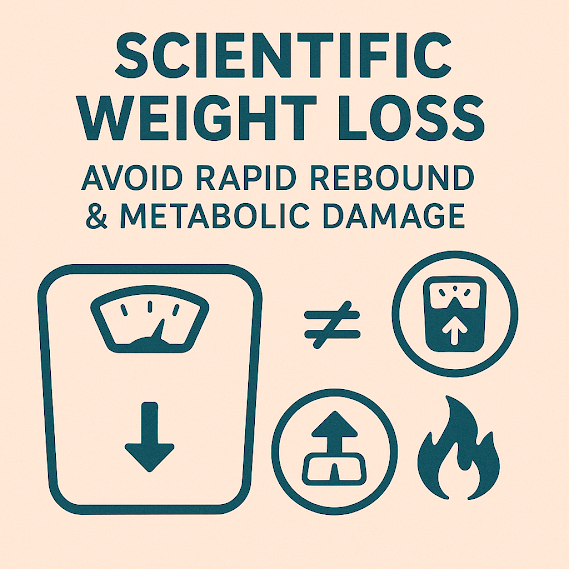Debunking 7 Misleading Weight Loss Myths
With countless weight loss methods emerging, how do you choose the right one? Experts warn against falling for weight loss myths. Opting for proper methods is the key to success! Below, we debunk seven common myths to guide you out of weight loss misconceptions, ensuring you stay on track without detours, failures, or rebounds!
Myth 1: “Avoiding Fat Guarantees Weight Loss”
Not Consuming Fat Doesn’t Ensure Weight Loss
Foods high in fat are calorie-dense, leading many to believe that cutting fat entirely leads to weight loss. This is a myth! Fat is an essential nutrient. Our brain functions rely on adequate fat intake, and organs like the heart and skin depend on it for optimal performance.
Extreme dieting or overly restricting food intake can cause issues like rough skin, often linked to impaired heart and brain function. Moderate fat consumption, when properly digested, can suppress ghrelin (the hunger hormone), reduce appetite, promote leptin production (which signals fullness), and lower the glycemic index (GI) of meals, helping you feel full longer.
A U.S. doctor’s research suggests that the low-fat diet trend since the 1980s has contributed to rising obesity and diabetes rates in America. Worse, completely eliminating fat can lead to rebound weight gain and binge eating!
Myth 2: “Energy Bars Are Great for Weight Loss”
Energy Bars Don’t Aid Weight Loss
Energy bars are nutrient-packed snacks often used as meal replacements in weight loss diets. However, these processed foods are easily absorbed by the body, which can hinder weight loss efforts.
Digestion and absorption require energy. Processed foods like energy bars are digested too quickly, reducing the energy expended in the process compared to natural foods. This unused energy accumulates in the body. In contrast, natural fruits and vegetables, rich in fiber, are harder to digest. They require more energy and stay in the stomach longer, promoting lasting fullness and aiding weight loss.
Myth 3: “Eating Slowly and Continuously Maintains Fullness”
Slow Eating Doesn’t Mean Endless Eating
Eating slowly, as opposed to fast eating, can prolong satiety, but this doesn’t mean you should eat constantly. Overdoing it can lead to trouble!
Experts note that constant eating can condition the body to lose its ability to distinguish between hunger and fullness, potentially causing discomfort when not eating. Thus, slow eating and smaller, frequent meals don’t justify non-stop eating. Proper portion control is crucial for effectiveness.
Myth 4: “Saturated Fats Cause Stretch Marks”
Saturated Fats Aren’t the Cause of Stretch Marks
Obese individuals, particularly those with high body fat, often develop stretch marks or cellulite, but these are not directly tied to body fat. Fat accumulation results from excess calorie intake, such as overeating grilled meats or sweets.
Saturated fats, primarily found in animal-based foods, support calcium and omega-3 fatty acid absorption, boost immunity, and protect vital organs. While saturated and trans fats were once vilified as obesity culprits, recent studies confirm that saturated fats are essential nutrients for the body.
Myth 5: “Exercise Allows You to Eat Anything”
Exercise Must Be Paired with Dietary Control
Here’s the truth: exercise alone won’t budge the scale. Experts emphasize that dietary control has a far greater impact on weight loss than exercise.
However, this doesn’t mean exercise is unnecessary. Diet and exercise are both critical for weight loss and must work together. Controlling appetite and improving diet lead to weight reduction, while consistent exercise tones the body. Combining both creates the perfect physique.
Myth 6: “Beer Causes Beer Bellies”
Beer Isn’t the Sole Cause of Beer Bellies
Alcohol contains 7 calories per gram, a significant amount, but compare that to proteins and carbohydrates (4 calories per gram) or fats (9 calories per gram). A study of over 19,000 American women found that non-drinkers were heavier than those who consumed beer or wine regularly, factoring in lifestyle habits like exercise, diet, and smoking.
So, does beer cause a “beer belly”? Not necessarily. Some people with normal BMI and body fat percentages still have large waists, often due to poor blood circulation, sluggish metabolism, or constipation rather than alcohol alone. While alcohol isn’t the primary driver of obesity, it’s still a toxin, and excessive consumption can hinder weight loss. Moderation is key.
Myth 7: “Low-Sugar Drinks Aid Weight Loss”
Low-Sugar Drinks Can Stimulate Appetite
Experts suggest that humans evolved to derive satiety from solid foods, not liquids. Sugary processed drinks like sodas, juices, or smoothies are major culprits in weight gain.
What about “low-sugar” or “zero-calorie” drinks? They don’t help with weight loss either. These beverages often contain artificial sweeteners, which, while lower in calories than sugar, still contribute calories. Liquids are inherently less satiating, often increasing appetite rather than curbing it.











Comments
Post a Comment